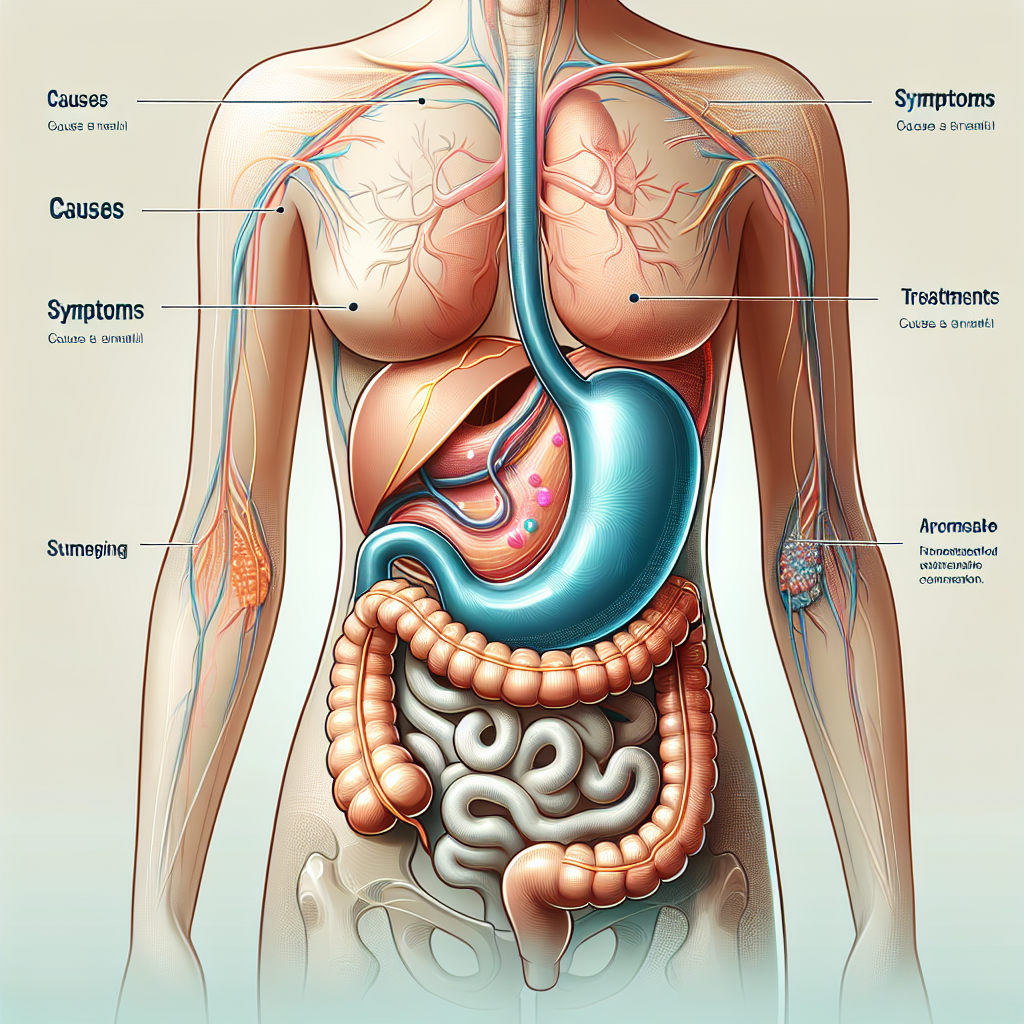What is Stomach Cancer?
Stomach cancer, also known as gastric cancer, involves the formation of abnormal cells that grow uncontrollably in the stomach lining. Most often, these cells form in the stomach’s inner lining, the mucosa, which produces digestive juices. This type of cancer, adenocarcinoma, accounts for over 90% of cases. The disease can affect different parts of the stomach, but it frequently originates at the junction between the esophagus and the stomach, or in the main part of the organ. Its progression is often slow, extending over several years, and symptoms may remain subtle in the early stages, sometimes leading to a delayed diagnosis.
Causes and Risk Factors for Stomach Cancer
Several factors increase the risk of developing stomach cancer. Chronic infection with the bacterium *Helicobacter pylori* is the primary cause; it leads to chronic inflammation called gastritis, which can progress to precancerous lesions. Diet also plays a significant role: high consumption of salted, smoked, or preserved foods, as well as low intake of fresh fruits and vegetables, promotes the onset of the disease. Smoking and excessive alcohol consumption also contribute to an increased risk.
Certain pre-existing medical conditions are risk factors. These include pernicious anemia, autoimmune atrophic gastritis, and gastric polyps. A family history of stomach cancer or certain hereditary genetic syndromes (such as Lynch syndrome or hereditary diffuse gastric cancer) also increase predisposition. Age is a non-modifiable risk factor, with the majority of diagnoses occurring after age 50.
Symptoms and Signs of Stomach Cancer
Symptoms of stomach cancer can be vague and non-specific in its early stages, often resembling common digestive issues. This explains the delayed diagnosis of the disease in many patients. Early signs include persistent indigestion, heartburn, a feeling of early satiety after eating small amounts of food, as well as unexplained nausea or vomiting.
As the disease progresses, more alarming symptoms may appear. These include unexplained weight loss, loss of appetite, persistent abdominal pain that does not subside, the presence of blood in the stool (sometimes blackened, indicating an upper digestive hemorrhage), or anemia due to internal bleeding. Chronic fatigue and general weakness often accompany these signs. It is imperative to consult a doctor if these symptoms persist, especially if they worsen or are new.
Diagnosis of Stomach Cancer
The diagnosis of stomach cancer relies on several examinations. Initially, the diagnostic process involves a clinical examination and a detailed inquiry into the patient’s medical history and symptoms. If the doctor suspects a problem, they may request blood tests to check for anemia or other markers.
Upper gastrointestinal endoscopy is the key examination for diagnosing stomach cancer. A gastroenterologist inserts a thin, flexible tube equipped with a camera (endoscope) into the esophagus, stomach, and duodenum. This allows direct observation of the gastric mucosa and the collection of tissue samples (biopsies) if abnormalities appear. Specialists then analyze these biopsies under a microscope to confirm the presence of cancerous cells. If the diagnosis is confirmed, complementary examinations such as CT scans, MRIs, or PET scans are often performed. They assess the extent of the disease and the possible presence of metastases.
Treatments and Management of Stomach Cancer
The treatment of stomach cancer depends on several factors, including the stage of the disease, the tumor’s location, and the patient’s general health. Surgery is the primary curative option for localized cancers. It involves partial or total removal of the stomach (gastrectomy), sometimes combined with the removal of nearby lymph nodes.
Before or after surgery, complementary treatments may be administered. Chemotherapy, which uses drugs to destroy cancer cells, is common. Radiation therapy, which uses high-energy rays to target the tumor, is another option. In some cases, a combination of these treatments optimizes results. For advanced or metastatic cancers, patients may benefit from targeted therapies, which specifically act on molecular mechanisms of cancer cells, or immunotherapies, which strengthen the body’s immune defenses against the disease. Patient care also involves managing symptoms and improving quality of life throughout the treatment journey.
Recent Scientific Advances in Stomach Cancer
Research on stomach cancer is constantly progressing, although no major breakthroughs were published in the first half of 2025. Efforts are currently focused on several promising fronts. Scientists are studying new biomarkers; these will be used for early detection and to predict treatment response. Clinical trials are also evaluating the effectiveness of next-generation targeted therapies, which block specific signaling pathways involved in tumor growth.
Moreover, immunotherapy continues to revolutionize the treatment of many cancers, and research is exploring its potential for stomach cancer, especially in combination with other approaches. In the field of diagnosis, artificial intelligence and machine learning techniques aim to improve the accuracy of interpreting endoscopic images for finer detection of precancerous lesions. These advances, although still in the research or trial phase for some, open new perspectives for more personalized and effective treatments in the future.
Prevention of Stomach Cancer
Stomach cancer prevention primarily relies on modifying lifestyle risk factors and managing specific infections. Eradication of *Helicobacter pylori*, often through antibiotic treatment, significantly reduces the risk of developing chronic gastritis and, consequently, cancer. Talk to your doctor for screening and appropriate treatment.
Adopting a healthy diet is crucial. This means prioritizing abundant consumption of fresh fruits and vegetables, whole grains, and lean proteins, while limiting processed, salty, smoked, and preserved foods. Quitting smoking and moderating alcohol consumption are essential steps. Maintaining a healthy weight also helps reduce the overall cancer risk. For individuals at high risk due to family history or genetic syndromes, regular medical follow-up with surveillance endoscopies may be recommended to detect and manage precancerous lesions at an early stage.
Living with Stomach Cancer
Living with stomach cancer represents a significant challenge, both physically and emotionally. Support from a multidisciplinary medical team is fundamental. This team includes oncologists, surgeons, nutritionists, and psychologists who will accompany the patient and their loved ones at every step. Learning to manage treatment side effects, such as digestive issues related to surgery or chemotherapy, may require dietary adjustments. A nutritionist offers personalized advice to maintain a stable weight and a balanced diet.
Psychological support is also crucial. Joining support groups or consulting a psychologist helps manage anxiety, depression, or stress related to the disease. Staying informed about their illness and treatments allows patients to make informed decisions. Finally, maintaining adapted physical activity and social connections contributes to a better quality of life and helps the patient live as well as possible with their illness.
Frequently Asked Questions (FAQ)
What are the survival chances for stomach cancer?
Survival chances strongly depend on the cancer stage at diagnosis. Cancers detected at an early stage, when confined to the stomach wall, have a significantly higher 5-year survival rate than advanced cancers that have spread to other organs. Treatment advancements are constantly improving projections.
What diet should a stomach cancer patient follow?
After stomach surgery and during treatments, patients often need to adopt a specific diet. It is advisable to favor smaller, more frequent meals, minimally processed and easy-to-digest foods, and avoid fatty, spicy, or very sugary foods. A nutritionist provides tailored advice for each situation.
Is stomach cancer hereditary?
In most cases, stomach cancer is not directly hereditary. However, about 1 to 3% of gastric cancers have a genetic component and are associated with specific inherited mutations. A family history of the disease increases the risk, especially if it affects close relatives at a young age.
How is stomach cancer screened for?
Stomach cancer screening is primarily performed via upper gastrointestinal endoscopy with biopsies. This procedure allows visualization of the stomach lining and collection of samples for analysis. In Asia, where incidence is higher, mass screening programs are sometimes implemented.
What are the side effects of stomach cancer treatment?
Stomach cancer treatments can lead to various side effects. Surgery may cause dumping syndrome (discomfort after meals), nutritional deficiencies, or difficulty eating. Chemotherapy often causes nausea, fatigue, hair loss, and decreased blood cell counts. Radiation therapy can cause fatigue and localized digestive problems. Each patient reacts differently, and the care team helps manage these effects.
Additional resources
- To extend your knowledge, more articles are available here.
Confused by your blood test results?
Get instant clarity. AI DiagMe interprets your blood test results online in minutes. Our secure platform translates complex medical data into an easy-to-understand report. Take control of your health today. Visit aidiagme.com to get your personalized insights now.

